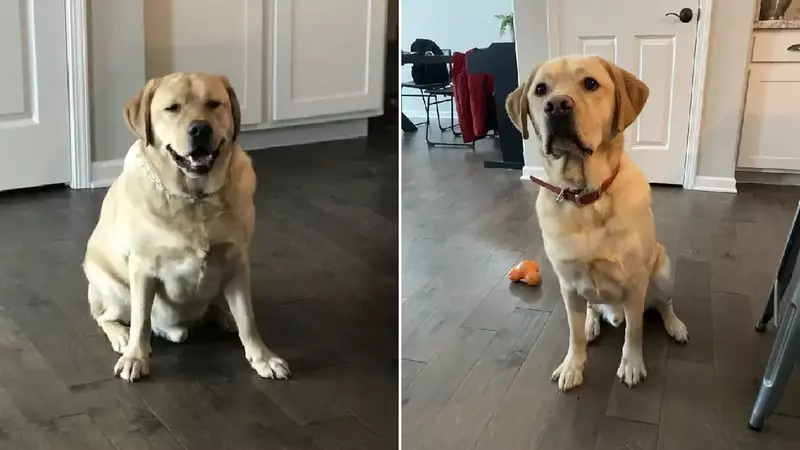Why Dog’s Weight Losing? Maintaining a healthy weight is crucial for the overall well-being and longevity of our canine companions. Obesity in dogs can lead to various health issues, including joint problems, heart disease, and a decreased quality of life. In this article, we will discuss the top 10 reasons why your dog may be losing weight and provide insights into addressing these concerns.
Why Dog’s Weight Losing? Understanding Healthy Weight in Dogs
Ideal Body Condition Score (BCS) for Dogs
The ideal body condition score for dogs is a numerical scale that assesses a dog’s body composition, including body fat and muscle mass. It helps determine if a dog is underweight, overweight, or at an optimal weight. Veterinarians use a BCS scale ranging from 1 to 9, with 5 being the ideal score indicating a healthy weight.
Reasons for Losing Your Dog’s Weight
Inadequate Nutrition and Feeding Practices
Why Dog’s Weight Losing? Inadequate nutrition and improper feeding practices can contribute to weight loss in dogs. Feeding an unbalanced or low-quality diet, inadequate portion sizes or irregular feeding schedules may result in insufficient caloric intake, leading to weight loss. Ensuring a well-balanced diet appropriate for your dog’s age, size, and activity level is crucial.

Underlying Medical Conditions
Underlying medical conditions can cause weight loss in dogs. Diseases such as kidney disease, diabetes, cancer, gastrointestinal disorders, and thyroid issues can affect a dog’s metabolism, nutrient absorption, or appetite, leading to unintended weight loss. Consultation with a veterinarian is necessary to identify and address any underlying health concerns.
Dental Problems and Difficulty Eating
Dental issues, such as periodontal disease or missing teeth, can cause discomfort or pain while eating. Dogs experiencing pain may avoid food or have difficulty chewing, resulting in weight loss. Regular dental check-ups, proper oral hygiene, and addressing any dental problems promptly are essential to ensure your dog’s ability to eat comfortably.
Parasites and Intestinal Issues
Why Dog’s Weight Losing? Parasites, such as worms or gastrointestinal infections, can affect a dog’s digestive system and lead to weight loss. These parasites consume nutrients from the dog’s body, depriving them of vital nutrients. Regular deworming and preventative measures, as recommended by your veterinarian, are crucial for maintaining your dog’s overall health and preventing weight loss.
Increased Physical Activity
Increased physical activity without adjusting the diet accordingly can lead to weight loss in dogs. Dogs engaging in more exercise or increased activity levels burn more calories, and if their caloric intake remains the same, weight loss may occur. It’s important to monitor your dog’s activity level and adjust its diet accordingly to ensure they are receiving adequate nutrition.
Stress and Anxiety
Stress and anxiety can impact a dog’s appetite and lead to weight loss. Events such as changes in the household, separation anxiety, or traumatic experiences can cause dogs to lose interest in food or experience gastrointestinal upset. Creating a calm and stable environment, providing mental stimulation, and addressing underlying stressors is essential to promote a healthy appetite.
Age-related Changes and Metabolism
As dogs age, their metabolism naturally slows down, and they may require fewer calories to maintain a healthy weight. Failure to adjust their diet accordingly can result in weight loss. Regular monitoring of your dog’s weight and consulting with a veterinarian can help ensure appropriate dietary adjustments as they age.
Side Effects of Medications
Certain medications may have side effects that can impact a dog’s appetite or nutrient absorption, leading to weight loss. If your dog is on any medications and you notice changes in their weight or appetite, consult with your veterinarian to determine if adjustments need to be made.
Heat and Environmental Factors
Why Dog’s Weight Losing? Extreme heat or environmental factors can impact a dog’s appetite and energy levels, potentially leading to weight loss. Dogs may eat less during hot weather or when exposed to stressful environmental conditions. Providing a cool and comfortable environment, ensuring access to fresh water, and adjusting feeding strategies during extreme conditions can help mitigate weight loss.
Poor Digestive Health
Poor digestive health, such as chronic diarrhea or malabsorption disorders, can result in weight loss. Dogs with these conditions may struggle to absorb nutrients properly, leading to inadequate caloric intake. Identifying and treating the underlying digestive issues is crucial to address weight loss and promote proper nutrient absorption.
Addressing Weight Loss in Dogs
Consultation with a Veterinarian
Why Dog’s Weight Losing? If your dog is losing weight, it is important to seek veterinary guidance. A veterinarian will conduct a thorough examination, evaluate your dog’s medical history, and perform necessary diagnostic tests to identify any underlying health conditions contributing to the weight loss.

Evaluating the Diet and Feeding Routine
Reviewing your dog’s diet and feeding routine is crucial. Ensure you are providing a well-balanced diet appropriate for your dog’s nutritional needs. Consider adjusting portion sizes or feeding frequency based on your dog’s age, weight, activity level, and any specific dietary requirements.
Medical Examination and Diagnostic Tests
A comprehensive medical examination and diagnostic tests may be necessary to identify any underlying medical conditions causing weight loss. Blood tests, fecal examinations, and imaging studies may be conducted to assess your dog’s overall health and detect any potential issues.
Dental Care and Oral Health
Regular dental care is essential to address any dental problems that may hinder your dog’s ability to eat comfortably. Routine dental cleanings and addressing any dental issues promptly can help restore their appetite and prevent weight loss.
Parasite Prevention and Treatment
Ensuring regular parasite prevention measures, including deworming, is vital in maintaining your dog’s overall health. Regular fecal examinations and following your veterinarian’s recommendations for preventative treatments help prevent weight loss due to parasites.
Providing Adequate Nutrition and Caloric Intake
Work closely with your veterinarian to ensure your dog receives adequate nutrition and caloric intake. They can guide you in adjusting your dog’s diet to meet their specific nutritional needs and promote healthy weight gain. This may involve switching to a higher-calorie diet, incorporating nutrient-dense foods, or adding supplements to support weight gain.
Managing Stress and Anxiety
Why Dog’s Weight Losing? If stress or anxiety is contributing to your dog’s weight loss, it’s important to address these underlying issues. Creating a calm and structured environment, providing mental stimulation, and using positive reinforcement techniques can help alleviate stress and promote a healthy appetite.
Adjusting Exercise and Activity Levels
If increased physical activity is causing weight loss in your dog, consider adjusting their exercise routine. Monitor their activity levels and ensure they are receiving enough rest and recovery time. Additionally, consult with your veterinarian to determine if any modifications to your exercise regimen are necessary.
Monitoring Medications and Their Effects
If your dog is on medications that may impact their weight or appetite, closely monitor their response to the medication. Consult with your veterinarian if you notice any adverse effects or changes in weight. They may recommend adjusting the dosage or exploring alternative medications if necessary.
Providing a Comfortable and Appropriate Environment
Creating a comfortable and appropriate environment for your dog is essential. Ensure they have access to clean water at all times, provide a suitable temperature-controlled space, and minimize stress-inducing factors. A calm and comfortable environment can help promote a healthy appetite and overall well-being.
Conclusion
Why Dog’s Weight Losing? Weight loss in Dogs can be a sign of underlying health issues and should not be ignored. Remember, if you notice significant or unexplained weight loss in your dog, it is crucial to consult with a veterinarian for a proper diagnosis and guidance. With timely intervention and a comprehensive approach, you can support your dog in achieving and maintaining a healthy weight.
Read Also: 5 Reasons Why Your Dog May Be Losing Weight
Frequently Asked Questions
My dog is losing weight, but I haven’t changed their diet. What could be causing this?
Unexplained weight loss in dogs can be caused by various factors, including underlying medical conditions, dental problems, parasites, increased physical activity, stress, or poor digestive health. It is recommended to consult with a veterinarian to identify the underlying cause.
Can stress and anxiety lead to weight loss in dogs?
Yes, stress and anxiety can impact a dog’s appetite and result in weight loss. Events such as changes in the household, separation anxiety, or traumatic experiences can cause dogs to lose interest in food or experience gastrointestinal upset.
Should I be concerned if my senior dog is losing weight?
Weight loss in senior dogs can be a common occurrence due to age-related changes and a slower metabolism. However, significant or rapid weight loss should not be ignored, as it can indicate underlying health issues. It is advisable to consult with a veterinarian for a thorough evaluation.

3 thoughts on “Why Dog’s Weight Losing? 10 Important Reasons”